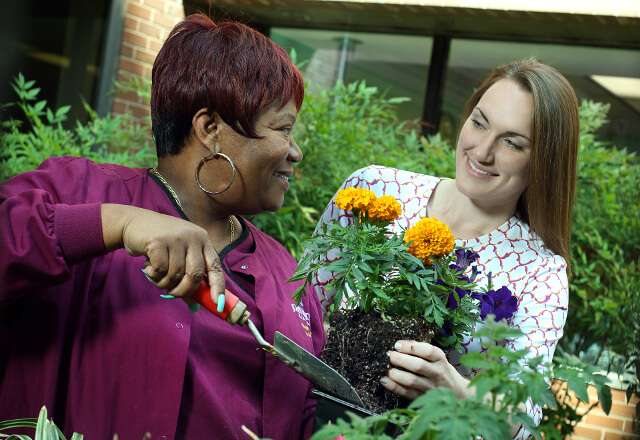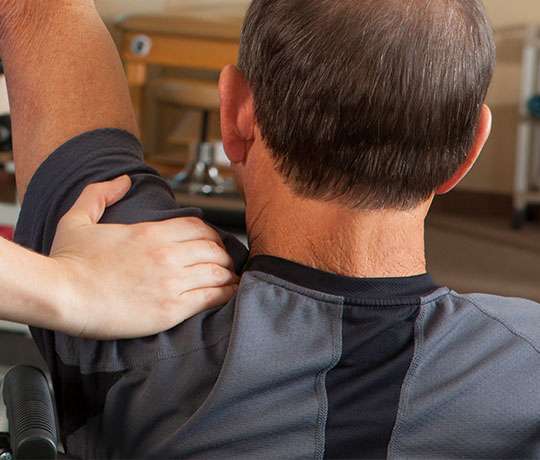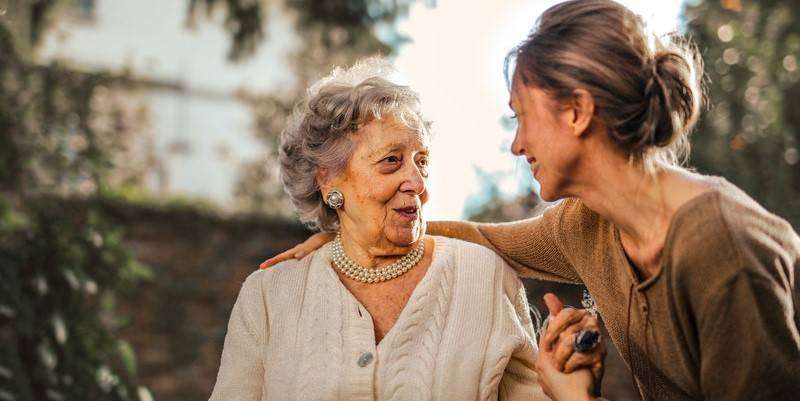This fellowship accomplishes in one year what may otherwise take many years to achieve professionally. The fellowship and the AOTA Board and Specialty Certification Program share an emphasis on the AOTA Standards for Continuing Competence: knowledge, critical reasoning, interpersonal skills, performance skills and ethical practice. It also prepares the fellow for subsequent promotion along the clinical ladder beyond the level of peers without board certification. As an employee of the Johns Hopkins Health System, the fellow will receive a salary, medical benefits and other full-time employee benefits, including paid time off.
Duration: 12 months
Accreditation: AOTA Approved
Application open: January 1, 2023
Application deadline: February 28, 2023
Admission decision: May
Program start: August
View program flyer
Please click the pay application link to pay the supplementary application fee. Application will not be processed until the fee is received and application is complete. All fees are non-refundable.
Apply Online
I was fortunate to work with a variety of mentors. Each of them offered guidance and direction regarding treatment interventions, group dynamics and evaluation measures. They challenged me to expand my knowledge while respecting and fostering my skill set to provide advanced clinical practice.
– Joanna Lackner, class of 2018
Fellowship Program Goals
- Foster an inquiry-based and experience-based opportunity to increase the knowledge base and skills of an entry-level clinician to incorporate the values and attitudes necessary to be an advanced practitioner successfully.
- Provide both clinical and didactic experiences along multiple service lines to progress the fellow’s clinical practice and clinical reasoning skills in the specialized area of mental health service delivery as evidenced by successful completion of an outcome-oriented curriculum.
- Embrace the mission of Johns Hopkins as an outstanding academic medical institution and the Department of Physical Medicine and Rehabilitation by providing high-quality, evidence-based care.
- Provide ongoing clinical mentoring based upon practice analysis, adult learning theory and active learning strategies and principles to promote the fellow’s intentional engagement throughout the program.
- Afford the fellow with opportunities to participate in advocacy efforts, outreach and education of others, participation in existing research and to execute a quality improvement project that is of publishable caliber and that adds to the body of evidence in the area of occupational therapy in mental health.
- Expect the fellow to be compliant with existing ethical standards of practice, become knowledgeable in local, state and federal laws and regulations that impact service delivery and demonstrate professional behaviors consistent with those of an advanced professional in the area of mental health.
Fellowship Program Features
- Specialized skills and knowledge in the area of mental health
- Advanced clinical practice across a continuum of care
- Evidence-based high-quality service delivery
- Advocacy, teaching and mentorship opportunities
- Participation in research and/or quality improvement projects for presentation or publication
Covered service areas include: general psychiatry, schizophrenia, mood disorders, child and adolescent psychiatry, geriatric psychiatry, substance use, pain treatment and eating disorders. The fellow will also be exposed to the Psychiatric Occupational Therapy/Medicine Consult Service.
Alumni Achievements
What our alumni have achieved after finishing the program:
- Advancing clinical practice models of existing clinical programs
- Becoming AOTA Board Certified in Mental Health
- Developing new occupational therapy clinical programs
- Obtaining advanced level and leadership therapy positions
- Presenting at the local, state and national level
- Teaching mental health curriculum in higher education programs
Fellowship Coordinator
Bobby Walsh, DBH, OTR/L, BCMH
2016 Fellowship Alumnus
Email: [email protected]
2016 Fellowship Alumnus

Current Fellow
Yalixsa Delgado, OTD, OTR/L | Class of 2023
Undergraduate school: Misericordia University, bachelor’s in health sciences
Graduate school: Misericordia University, master’s in occupational therapy and doctorate in occupational therapy
Hometown: Hopatcong, New Jersey
Professional interests: community mental health, forensic psychiatry, OT advocacy, inclusion and diversity, occupational injustice
Why I chose Johns Hopkins: It is a once in a lifetime opportunity to spend a year experiencing the scope of mental health occupational therapy services across the lifespan while being mentored through the process by experts in the field. I chose Johns Hopkins to grow my skills as a mental health clinician, researcher, leader, and OT advocate in a supportive, diverse environment.
What I like about Baltimore: I love how Baltimore is rich in history, cultural diversity, art, music, and food. There is so much to do, see, and experience in every neighborhood!

Fellowship Alumni
-
Grace Hart, OTR/L | Class of 2022
Undergraduate school: The Ohio State University, bachelor’s in early and middle childhood education
Graduate school: Lenoir-Rhyne University, master’s in occupational therapy
Hometown: Dublin, Ohio
Professional interests: forensic psychiatry, occupational justice, pediatric mental health
Why I chose Johns Hopkins: I was drawn to the fellowship for the opportunity to observe and practice in multiple service areas within the field of mental health occupational therapy and to increase my knowledge of assessment and treatment specific to each service area. I chose Johns Hopkins for the opportunity to develop my clinical knowledge and skillset as a therapist while learning from some of the best therapists in the field of mental health OT. The hospital’s reputation for excellence in patient-centered care and for the development and use of evidence-based practice were additional aspects that led me to choose Johns Hopkins.
What I like about Baltimore: I love the parks in the city and running along the promenade by the water. Baltimore is a very walkable city and I love starting my morning with a walk to work and ending the day with a walk to dinner.
-
Katy Schmidt, OTD, OTR/L | Class of 2021
Undergraduate school: Belmont University, bachelor’s in psychological science and bachelor’s of music in music performance
Graduate school: Belmont University, doctorate of occupational therapy
Hometown: Nashville, Tennessee
Professional interests: chronic pain, substance use disorders, mental health in the criminal justice system, mental health in schools, evidence-based practice
Why I chose Johns Hopkins: I chose this fellowship at Johns Hopkins because it offers clinical experiences in a variety of psychiatric services at a world-renowned hospital. In addition, the program includes mentorship from multiple specialists in the field of mental health occupational therapy. This fellowship and its diverse assortment of educational opportunities will certainly support my professional goals of promoting mental wellness through clinical excellence, program development, research and education.
What I like about Baltimore: Baltimore has a vibrant culture, rich with history, architecture, art, music, and food. I love getting to know the unique characters of the various neighborhoods.
-
Samantha Susson, OTR/L | Class of 2020
Undergraduate school: University of Delaware, bachelor’s in health studies
Graduate school: Thomas Jefferson University, master’s in occupational therapy
Hometown: Voorhees Township, New Jersey
Professional interests: community-based practice for people with serious mental illnesses
Why I chose Johns Hopkins: I chose Johns Hopkins because of the ability to see multiple areas of psychiatry, and the way that assessment and intervention strategies differ based on someone’s diagnosis and the opportunity to be mentored by many clinicians who are working at the top of our field.
What I like about Baltimore: I love the pathway around the harbor where you can see the boats sailing on the water, and that there are so many great parks to be in nature both within the city and close by.
-
Kelsey Nicks, OTR/L | Class of 2019
Undergraduate school: Northern Arizona University; bachelor’s in psychology
Graduate school: California State University, Dominguez Hills; master’s in occupational therapy
Hometown: Monterey, California
Professional interests: reducing the mental health stigma, children and adolescents, prevention and community-based mental health, advocacy for mental health/occupational therapy, program development
Why I chose Johns Hopkins: I chose Johns Hopkins because it is a leading innovator in the healthcare industry and I wanted to be a part of a team and organization that prioritizes client-centered care, evidenced-based practice and motivates me to be better. I was previously doing program development for a community-based facility as the only occupational therapist and I wanted to enhance, expand and solidify my knowledge and experience as an advanced occupational therapy mental health practitioner, thus I looked to Johns Hopkins to bridge the gaps in my professional endeavors. Furthermore, I was seeking mentorship as I strongly believe that surrounding oneself with like-minded individuals is a sure way to reach goals and challenge capabilities.
What I like about Baltimore: I have only been here three weeks, but when I visited I fell in love with the cobblestone roads, the historic and artsy feel, the down-to-earth people, and all the red brick!
-
Joanna Lackner, OTR/L | Class of 2018
Read Q&A with Joanna about her fellowship experience.
Undergraduate school: University of Minnesota; bachelor’s in psychology
Graduate school: Washington University School of Medicine in St. Louis, master’s in occupational therapy
Hometown: Minneapolis, Minnesota
Professional interests: affective disorders, pediatric mental health
Why I chose Johns Hopkins: This well-designed fellowship focuses on mentorship and excellence in evidence-based practice. The program provides a diverse collection of educational experiences, including opportunities to attend didactic lectures within the Department of Psychiatry and Behavioral Sciences, advocate to further our profession at the state and national levels, and receive personalized mentorship throughout each of the eight service line rotations.
What I like about Baltimore: Baltimore is a city filled with history and culture — there’s always something to do in one of the city’s great neighborhoods. Baltimore is also within driving distance of many great destinations such as D.C., Philadelphia and the Eastern Shore.: University of Minnesota; bachelor’s in psychology: Washington University School of Medicine in St. Louis, master’s in occupational therapy: Minneapolis, Minnesota: affective disorders, pediatric mental health: This well-designed fellowship focuses on mentorship and excellence in evidence-based practice. The program provides a diverse collection of educational experiences, including opportunities to attend didactic lectures within the Department of Psychiatry and Behavioral Sciences, advocate to further our profession at the state and national levels, and receive personalized mentorship throughout each of the eight service line rotations.: Baltimore is a city filled with history and culture — there’s always something to do in one of the city’s great neighborhoods. Baltimore is also within driving distance of many great destinations such as D.C., Philadelphia and the Eastern Shore.

-
Elizabeth Duggan, OTR/L | Class of 2017
Undergraduate school: State University of New York at New Paltz in New Paltz, NY; bachelor’s in visual arts education and bachelor’s of fine arts in photography
Graduate school: University of Pittsburgh in Pittsburgh, PA; MOT in occupational therapy
Hometown: East Amherst, New York
Frequently Asked Questions
-
Fellows are scheduled for 40 hours a week. We will try to accommodate your scheduling requests. There will also be independent study readings to be completed on your own time.
-
Fellows are scheduled for an average of 15 hours a week of direct billable patient care during clinical modules.
-
Fellows don’t have to pay out of pocket for any didactic courses they attend at Johns Hopkins. In addition, you will get a stipend to cover some of the cost for CEU courses, local or national conferences, the amount of which will fluctuate based upon annual budget.
-
Each clinical area maintains its own library of references for evidence-based practice and clinical protocols, patient education handouts and service-based learning packets. The Department of Psychiatry and Behavioral Sciences also maintains a library of psychiatry journals and books, which are available to staff as needed. In addition, at least one clinical specialist is assigned to each area of the Department of Physical Medicine and Rehabilitation for mentoring and consultation related to clinical practice. This person maintains over 10 years of clinical experience and has demonstrated involvement and knowledge in research, quality improvement, clinical programming and evidence-based practice.
-
The Department of Physical Medicine and Rehabilitation provides full access to all treatment areas, all assessment tools and treatment modalities/equipment therein for fellowship use. The psychiatric occupational therapy staff maintains a clinic space on the second floor of the Meyer Building, which includes an activities of daily living (ADL) area, an ADL bathroom, a kitchen, an outdoor patio and space for individual and group treatments. The psychiatric units are also utilized for therapy services and each has a day room, activity room, some treatment space, full kitchen and tub/shower rooms.



